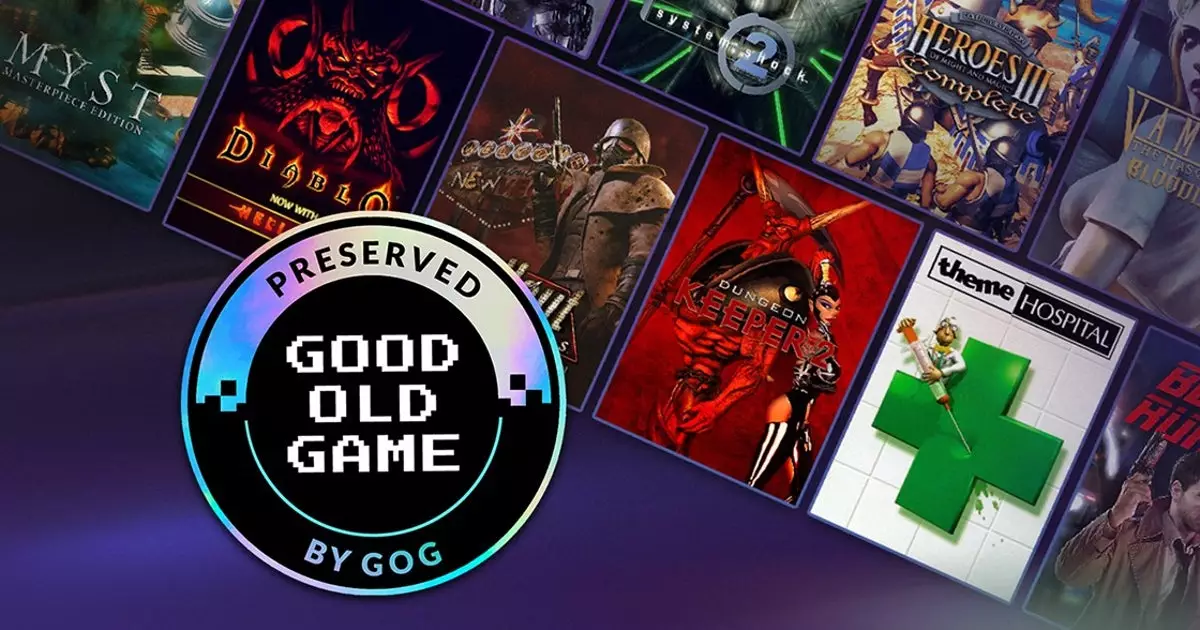Over the years, GOG (formerly known as Good Old Games) has evolved into a multifaceted platform catering not only to nostalgia-seeking gamers who favor classic titles but also to a new generation that craves contemporary blockbusters. However, this shift has raised some eyebrows, as GOG’s reputation as a bastion of game preservation appears to have blurred, transitioning it into a more commercialized version resembling Steam—complete with its own set of modern games but lacking the unique charm of solely focusing on the classics. Yet, GOG is taking a refreshing step back to its roots with the unveiling of the GOG Preservation Program, an initiative aimed at breathing new life into older titles and ensuring their compatibility with today’s hardware.
The GOG Preservation Program serves as an extension of the store’s ongoing initiatives to restore older games to their former glory. This program is not merely about reselling classic titles; it’s focused on systematically revitalizing them to ensure they are functional and enjoyable for a contemporary audience. By addressing compatibility issues, the program echoes some aspects of Valve’s Steam Deck Verified system, which is designed to inform users how well games perform on the handheld platform. GOG’s in-house team will tackle bugs and enhance features, including modern video codecs and compatibility with current operating systems like Windows 10 and 11. This meticulous restoration process culminates in a badge of approval: the “Good Old Game” emblem.
What does it mean to earn this badge? It signals that a title has been thoroughly updated and is ready for play without the need for external patches or mods. This upgrade not only improves the gaming experience but ensures that these now-modern classics are the most comprehensive versions available. Gamers can expect updated downloadable content (DLC), expansions, and additional resources like manuals and alternative languages. The cherry on top is the promise of offline installers, devoid of digital rights management (DRM)—a boon for those who prioritize ownership and accessibility.
To kickstart this impressive initiative, GOG is relaunching a staggering collection of over 100 games, many of which are beloved classics. Titles like the original Resident Evil trilogy, Diablo alongside its Hellfire expansion, and System Shock 2 are making a comeback. Not to mention fan favorites such as Vampire: The Masquerade – Bloodlines and the Fallout series. The opportunity to experience these classic titles with contemporary convenience is enticing, though one cannot help but ponder the potential for greater modern game inclusions, such as acclaimed series like New Vegas, which many players still yearn to enjoy without extensive modding.
While some may question the emphasis on older titles, it is essential to recognize that this preservation effort is not an outright rejection of modern gaming. Instead, it represents a significant push toward maintaining the cultural legacy of video games. GOG’s proactive approach to restoration aligns with growing concerns about the longevity of older games that may become unplayable due to server shutdowns or hardware incompatibilities. Players are becoming increasingly vocal about their dissatisfaction, with some even resorting to legal avenues against publishers who disappear games from circulation.
GOG’s mission remains ambitious: to incorporate all games, whether recent or classic, into the Preservation Program eventually. Acknowledging that many classics are still waiting in the wings for confirmation, GOG’s team faces considerable hurdles, not least of which is obtaining permissions from original developers and publishers. This can be a complicated process, as the gaming industry balances player interests against commercial viability. Nevertheless, by prioritizing a game preservation pipeline, GOG ensures that these classic titles find new audiences without becoming relegated to digital oblivion.
In a time when the industry has seen countless titles vanish due to server closures and corporate decisions, GOG’s dedication to revitalizing these games is both timely and necessary. It reflects a commitment not just to gaming nostalgia but to maintaining a sustainable model that can ensure the survival of beloved titles for generations to come. As critics and enthusiasts alike watch closely, it is hoped that GOG will thrive in this undertaking, not just for its profit but for the preservation of gaming history itself. With continued support and a clear vision, the GOG Preservation Program may just solidify GOG’s legacy as a genuine steward of game history.


Leave a Reply